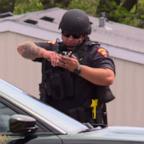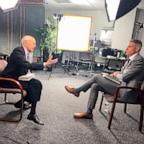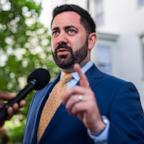Jimmy Butler, other Heat players open up on racism in online town hall
In a candid and passionate online town hall discussion hosted by the Miami Heat, All-Star forward Jimmy Butler recounted one of his first experiences with racism and declared that "now is the time to change."
Butler was one of several Heat players who shared their deeply personal experiences and engaged in difficult discussions about racism, social injustice and police brutality facing the black community in the town hall held on Friday's observance of Juneteenth, the holiday that commemorates the effective end of slavery.
Butler recalled an incident when he was 16 and was walking out of a Walmart in suburban Houston with his brother.
"A white man and his son, who is no older than maybe 6 -- I'm walking with my brother, and we hear the kid turn around and say, 'Hey, Dad, those are those n-words that you are telling me about,'" Butler said. "The kid doesn't know any better. My initial reaction was to turn around and look at the father's face. I'm 6-[foot]-6, and my brother is 6-[foot]-1, and he's probably 6-foot, and yeah, he was intimidated by me. But the first thing that popped in my head was, 'You had to [have] taught him that.' [The kid] doesn't know that. My daughter, I have to teach her that the stove is hot. You are choosing to teach your kid hate.
"It was so confusing to me because I was 16. ... To me, that is what all of this stems from. Everybody is being taught this hate, and it is super hurtful. You know the difference between right and wrong. For that parent to teach his kid at that young of an age, there is no other word for it except for wrong. This is crazy. This is the world that we live in. Now is the time to change."
Butler stressed the importance of staying unified, adding that "all of this hate, like it or not, is kind of breeding more hate."
During the Zoom session, which was moderated by Heat head coach Erik Spoelstra, several Heat players from different backgrounds recounted experiences with racism and discussed how they can effect change and improve race relations.
Heat power forward Meyers Leonard acknowledged benefiting from white privilege.
"I was raised to know right from wrong," he said. "Period. Everything that has been going on for years has been wrong. ... It's hard to understand because I'm white. I have white privilege. That is a fact. It doesn't matter if I grew up with nothing. I still have white privilege."
Heat point guard Goran Dragic, who is Slovenian, admitted that being from a different country made it difficult for him to speak on the history of racism in the U.S., but he emphasized that it is important for him to teach not only himself but also his children.
"When I was young, we had war. In our part of the world, it was more racism by religion," Dragic said. "It's crazy now that I'm here in the States, I need to teach my kids both ways. It doesn't matter what religion, which country you are from or what kind of color you are.
"Right now, if I'm honest, I'm not comfortable with this meeting because I don't know what to say because I'm coming from a different part of the world. Now I see around the world, there is a good thing because everybody is demonstrating. ... I cannot imagine how you guys are feeling. Like Meyers said, I have white privilege. I don't know. It's really hard to talk right now, but at the same time, the only thing I can do is try to teach myself and try to teach my kids and learn as much as possible."
Heat forward Solomon Hill told the team that he has often experienced racism. He described the experience of having others try to touch his hair and how it would make him feel like a pet dog.
"I love my hair," Hill said. "I used to cut my hair because of what other people said about my hair. My first experience [with racism] as a kid, having my hair long, having a 'fro, I do have a different texture than most people, and people just coming up and touching my hair like I'm some dog that is being walked.
"I never could have imagined myself walking up to a little white girl and just touching her hair randomly in a shopping center. That is, like, the opposite of what any black man should ever do, but it was commonplace for people to come up and touch my hair and normalize how different it was."
Hill said government and police officials need to be held accountable, much like a Heat player is held accountable for his actions by the organization that prides itself on Heat culture.
"When we try to hold the police accountable, schools accountable, our officials accountable, they can hide," Hill said. "That is not going to help anything. ... It ends up leading to these moments where we boil over. Some of the past killings aren't new.
"George Floyd's killing was just the nail in the coffin, the one that people got tired of, and then it became a movement."
Spoelstra said the Heat organization is committed to initiatives such as this town hall and creating voting awareness.
"In many ways, this town hall is like our virtual team peaceful protest," the Heat coach said. "And we are protesting against systemic racism, against the social injustices, the social inequalities, in the cases of police brutality against the black community that we see far too often.
"We are fed up with it just like everybody else. We want to see change. And we want to show full support of the Black Lives Matter movement as a team and organization. The time to be silent or sweeping these topics under the rug, those are long gone."




